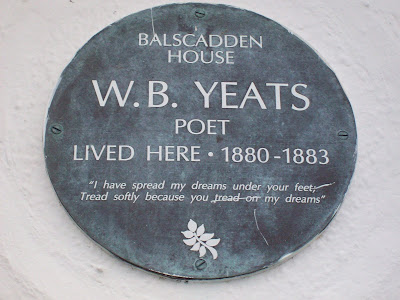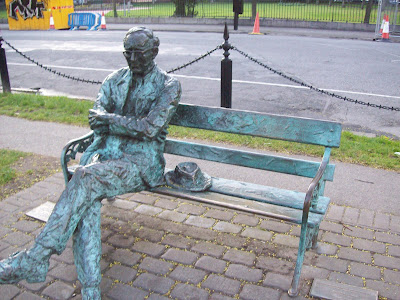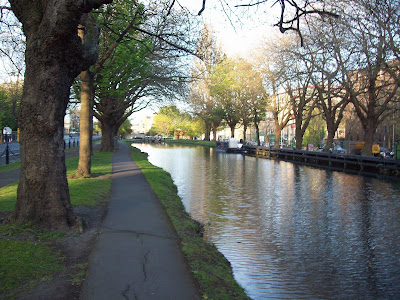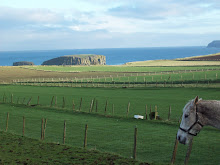I was delighted when I was reminded this morning, by my fantastic Irish Literature professor at who I had in Champlain Dublin, of the annual holiday that is celebrated worldwide called 'Bloomsday.' Bloomsday celebrates the journey of Leopold Bloom, the main character in James Joyce's Ulysses, which he took around Dublin on June 16, 1904. You can follow his journey around Dublin on the James Joyce Centre's website.
There are many literary pubs throughout Dublin. Davy Byrnes, is one of these literary pubs, and was part of Blooms' journey! You can find a list of more literary pubs in Dublin here.
Events are happening throughout Dublin and around the world, but I'd like to highlight one because it encouraged cycling and acted as a fundraiser for the Irish Youth Foundation! The Bloomsday Messenger Bike Rally & Lunch took place last Friday, and I hope people got out and cycled Dublin and supported the cause. It sure looked like fun...you can watch this video about it which was on TV3 to learn more about the event. (I also enjoyed this video for the Irish accents which I miss!).
Happy Bloomsday, everyone! How are you celebrating?
Wednesday, June 16, 2010
Friday, April 24, 2009
The Age-Old Question of Irish Identity

After studying all of these Anglo-Irish texts, from Wilde to Banville, I'm left wondering what constitutes Irishness?
Is it the red hair and freckles (no - that's from the vikings I'm told!)?
Is it the popular social gathering place being the pub (with Guinness the pint of choice)?
Is it the ever-looming evidence of 700 years of oppression and the fight for independence?
Maybe it's the dark sense of humour or their favorite word of emphasis -Feckin' which Roddy Doyle does so well.
Is it the friendiness and the accents which differ from county to county (or even which side of the Liffey if you're in Dublin!)?
What about the question of the Irish language? Gaelic or Irish to be precise.
Yes, there is Gaelic written on all of the signs in Ireland, Irish students can't get into university without passing Irish no matter if they have straight A's in every other subject. Why are all the great Irish writers writing in English, or some even French (Beckett)? There's a simple answer, but its implications are more complex. Speaking Irish was not always encouraged in schools the way that it is today. There have been periods in history where Irish was looked down upon, if you wanted to do business you had to know English. In the West, there are are still places where Irish is the predominant language, called The Gaeltact - or Irish-speaking region.
The answer to my first question can be found in the array of styles, types of texts (plays, short stories, poems, novels) written by the authors I've read throughout the semester. Some are short and to the point, while others are very detailed. Irishness can not be defined. History has had a large impact - some element of history (even if only discreetly by Beckett) is mentioned by every single author I read this semester. Irishness is still developing, and their question of identity cannot be answered by me, simply an American who lived here for 4 months.
What I can tell you is how I compare the Irish to other European cultures I've experienced. The Irish know how to make a beer - and know that the pint is the perfect size (something the Dutch could learn - for example). You can smile freely in Ireland and not have to worry that someone will take it the wrong way (unlike in Austria where to smile at someone means you're interested!). You can talk to anyone for directions and most people will go out of their way to make sure you arrive at your destination. If you go to the pub with a local and just meet them - they will insist on buying you a pint no matter how much you protest - it's just the Dublin way of saying "Failte." Once you get used to one accent - good for you! One down, about 26 to go - one for each county (nevermind the 6 counties in the North)! Those are just some of the things I've noticed in my time here, and they've made me love the Irish.
W.B. Yeats Exhibition
While driving west from Dublin towards Galway for our weekend class trip I couldn't help but think that W.B. Yeats would have gone the same way tours Coole Park to meet with his friend Lady Gregory. Yeats is probably one of the most famous poets. His poems center around themes such as Irish history (Easter 1916), myths and legends (The Stolen Child) and the sereneness of nature (The Lake Isle of Innisfree). Another theme which is also the central theme in Beckett's play Endgame considers the process of aging and so does Yeats' poem The Wild Swans at Coole.

Yeats was one of the first Anglo-Irish poets I would discover in Ireland during our hike in Howth during Orientation. Although he only lived in Howth for a few years, his house has a plaque which we all read with interest. It was nice that my Irish literature class would expose me to his poems throughout the semester because they really are beautiful. I learned that the quote on the plaque is from his poem He wishes for the Clothes of Heaven which he wrote for the love of his life, Maud Gonne (mostly an unrequited love).
Yeats' life is very interesting, and his role in the founding of the Abbey Theatre in Dublin with Lady Gregory's help as well is partly why he is so well known. The National Library of Ireland on Kildare Street (right near Grafton Street and St. Stephen's Green) is doing a wonderful and interactive exhibition on The Life and Works of William Butler Yeats which I would highly recommend. They are extending the exhibit until the end of 2009 so check it out while you still can.

Yeats was one of the first Anglo-Irish poets I would discover in Ireland during our hike in Howth during Orientation. Although he only lived in Howth for a few years, his house has a plaque which we all read with interest. It was nice that my Irish literature class would expose me to his poems throughout the semester because they really are beautiful. I learned that the quote on the plaque is from his poem He wishes for the Clothes of Heaven which he wrote for the love of his life, Maud Gonne (mostly an unrequited love).
Yeats' life is very interesting, and his role in the founding of the Abbey Theatre in Dublin with Lady Gregory's help as well is partly why he is so well known. The National Library of Ireland on Kildare Street (right near Grafton Street and St. Stephen's Green) is doing a wonderful and interactive exhibition on The Life and Works of William Butler Yeats which I would highly recommend. They are extending the exhibit until the end of 2009 so check it out while you still can.
The Man Behind [One] Dublin Statue

Everyone knows about Oscar Wilde statue also known as the "fag on the crag" and many other vulgar terms. Living next to the canal in Dublin, I walk past this one statue every week on my way to the grocery store across the canal. We didn't read any of his works in class, but I discovered from one of his poems posted on the wall in the Starbucks across the canal from his statue - the man sitting on a bench - was the poet, novelist and critic, Patrick Kavanaugh.
Studying media, and always questioning the truth of the media, I found some of his quotes to be quite refreshing. Kavanaugh was born in Inniskeen, Co. Monaghan which is, today, near the border of Northern Ireland. His experience also included time as a journalist and a film critic for the Irish Press. In 1948 his novel Tarry Flynn was published and banned by the Irish government. The plot surrounded a common theme in Kavanaugh's works - rural life in Ireland.

The reason why his statue resides on the canal in Dublin, was because he used to like to spend time there (according to the caption of the poem in the Starbucks). I've provided the view that he might have enjoyed on one of the nice, sunny days in Dublin. It's really a peaceful area. As a Public Relations major, I really enjoyed his quotes about his lack of confidence in the truthfulness of the media two quotes include "What appears in newspapers is often new but seldom true," and "It is impossible to read the daily press without being diverted from reality. You are full of enthusiasm for the eternal verities--life is worth living, and then out of sinful curiosity you open a newspaper. You are disillusioned and wrecked."
I would have liked to learn more about him, but I can satisfy that craving when I get back to the US and go to the library.
Joyce & Paris: In his own words
In a letter to his future bride on the 29th of August 1904 Joyce wrote to Nora Barnacle the reason why he left Ireland. In his letter he stated the following : I did not agree with the social order of the time, or Christianity having left the Catholic Church six years before. Ireland was a home that came with certain values governed by religious doctrines. He also mentioned the lack of a connection with his fifteen siblings, with the exception of one brother. He felt guilt and anger about the death of his mother from cancer, but he insisted that her death was caused by his father's mistreatment of her; she was a victim of the social order and he hated that which caused her death.
Nora Barnacle did not become his wife until 1931, but they had a rendezvous as early as June 1904. This letter was written shortly after this event; Joyce corresponded with Nora quite frequently. Nora is a name which is associated with the authors of Anglo-Irish literature, and the literature of the late 19th - 20th century. Henrik Isben was an influence of Beckett, who also knew Joyce's Nora and the protagonist;s name in A Doll's House was also Nora.
Nora Barnacle did not become his wife until 1931, but they had a rendezvous as early as June 1904. This letter was written shortly after this event; Joyce corresponded with Nora quite frequently. Nora is a name which is associated with the authors of Anglo-Irish literature, and the literature of the late 19th - 20th century. Henrik Isben was an influence of Beckett, who also knew Joyce's Nora and the protagonist;s name in A Doll's House was also Nora.
Tuesday, April 7, 2009
Paris: A City of Political and Artistic Sanctuary
James Joyce wasn't the first Irish author to escape to Paris, instead he was among a few notable authors including Oscar Wilde and Samuel Beckett. Upon visiting Paris, I was in awe of the city rich in art, history and beauty. The pull of la cite de lumiere was apparent upon these authors. Paris and other old, European cities relish in their history, and Joyce once said "The Irish are the most belated race in Europe." Perhaps that related to the point that the Irish don't have as much of their own self-created history because of British oppression.
Samuel Beckett is one of the top 5 most-written about people in history, which is why his universal plays, most notably Waiting for Godot and Endgame are well known throughout the world. He was a playwright, a poet and an author who wrote in French and then translated his works into English. Beckett's name popped up in the metro station [see photo below] and I thought of him as I sipped tea at a cafe people-watching out the window. If you read Waiting for Godot, reviewed by Vivian Mercier as, "A play where nothing happens...twice," then you will get a sense of Beckett's sarcastic, narcissistic, dark sense of humour - common throughout Anglo-Irish literature, and a notable Irish characteristic (likely a side effect of 700 years of oppression). Beckett is buried in a cemetary in the Montparnasse area of Paris, which I visited but was unable to make it to his grave site.

Although Oscar Wilde spent most of his time in London, he also escaped to Paris. The Picture of Dorian Gray is one of Wilde's most noted worked, and is based in London (NOT Dublin, a common misconception).
Finally, Joyce was also found in my short stay in Paris when I came across the famous bookstore Shakespeare and Company. This bookstore is imporant because they were the first to publish Joyce's novel Ulysses. I, myself, bought a book to commemorate my visit which is often done by tourists. You get a stamp from the store on whatever title you choose to buy (I chose my favorite Shakespeare play, Julius Caesar as it seemed appropriate).

Since you now understand the importance of Paris as an artistic sanctuary of Irish authors and its connection to Ireland you should add Paris to your list of European cities to visit!
Samuel Beckett is one of the top 5 most-written about people in history, which is why his universal plays, most notably Waiting for Godot and Endgame are well known throughout the world. He was a playwright, a poet and an author who wrote in French and then translated his works into English. Beckett's name popped up in the metro station [see photo below] and I thought of him as I sipped tea at a cafe people-watching out the window. If you read Waiting for Godot, reviewed by Vivian Mercier as, "A play where nothing happens...twice," then you will get a sense of Beckett's sarcastic, narcissistic, dark sense of humour - common throughout Anglo-Irish literature, and a notable Irish characteristic (likely a side effect of 700 years of oppression). Beckett is buried in a cemetary in the Montparnasse area of Paris, which I visited but was unable to make it to his grave site.

Although Oscar Wilde spent most of his time in London, he also escaped to Paris. The Picture of Dorian Gray is one of Wilde's most noted worked, and is based in London (NOT Dublin, a common misconception).
Finally, Joyce was also found in my short stay in Paris when I came across the famous bookstore Shakespeare and Company. This bookstore is imporant because they were the first to publish Joyce's novel Ulysses. I, myself, bought a book to commemorate my visit which is often done by tourists. You get a stamp from the store on whatever title you choose to buy (I chose my favorite Shakespeare play, Julius Caesar as it seemed appropriate).

Since you now understand the importance of Paris as an artistic sanctuary of Irish authors and its connection to Ireland you should add Paris to your list of European cities to visit!
Wednesday, April 1, 2009
Ireland as a Place of Imprisonment
Upon arrival of Dublin, I heard that if Dublin was leveled, there would be two books by James Joyce, Dubliners and Ulysses, upon which the city could be built due to their deep descriptions of Dublin. Although I see Dublin as a much nicer city today, than the city Joyce writes about in his short stories in Dubliners, the book is essentially about the lives of people in Dublin. The themes touched by these stories are poverty, effects of colonization, and finally the shared, defeated feeling of its characters who feel trapped financially and socially. They also share the desire to escape Dublin.
One story is called Araby, and it's about a young boy whose sole desire is to please a woman by going to the market to choose a gift for her. He is disappointed when the man he needs to get money from to go to the market gets home so late he can't find anything worthy at the market because it's so late at night. This common feeling of elation and then defeat is common throughout the stories. Its characters long for a better future, one which apparently is not coming.
This theme is demonstrated by another story, Eveline. This young woman's wish is to esacape a life of hard work and responsibility to run off with her sailor to Buenos Aires. Upon arrival of the boat to take her away with her love, she ultimately decides to stay in Ireland and continue her mediocre life - almost in an act of self-punishment.
Another notable work and preample to the masterpiece Ulysses, is Portrait of the Artist as a Young Man. This autobiographical novel of Joyce's life is dominated by the main character, Stephen Dedalus (James Joyce?). It's style is "free, indirect discource" which is written in the way Joyce thought people would think and speak at that time. This novel looks more into the religious and political unrest at the time, as well as the question of language (Irish-speaking versus English yet another future post to cover that topic...). Again, the appearance of a flight motif is evident. Events in this book, how Joyce felt about his family life, his father who was an alcoholic and the pressures of supporting a family made me think of a song by The Recieving End of Sirens on their latest album:
Joyce himself escaped to Paris and his reasons why will be evidenced in a letter that will be my next post.
One story is called Araby, and it's about a young boy whose sole desire is to please a woman by going to the market to choose a gift for her. He is disappointed when the man he needs to get money from to go to the market gets home so late he can't find anything worthy at the market because it's so late at night. This common feeling of elation and then defeat is common throughout the stories. Its characters long for a better future, one which apparently is not coming.
This theme is demonstrated by another story, Eveline. This young woman's wish is to esacape a life of hard work and responsibility to run off with her sailor to Buenos Aires. Upon arrival of the boat to take her away with her love, she ultimately decides to stay in Ireland and continue her mediocre life - almost in an act of self-punishment.
Another notable work and preample to the masterpiece Ulysses, is Portrait of the Artist as a Young Man. This autobiographical novel of Joyce's life is dominated by the main character, Stephen Dedalus (James Joyce?). It's style is "free, indirect discource" which is written in the way Joyce thought people would think and speak at that time. This novel looks more into the religious and political unrest at the time, as well as the question of language (Irish-speaking versus English yet another future post to cover that topic...). Again, the appearance of a flight motif is evident. Events in this book, how Joyce felt about his family life, his father who was an alcoholic and the pressures of supporting a family made me think of a song by The Recieving End of Sirens on their latest album:
Joyce himself escaped to Paris and his reasons why will be evidenced in a letter that will be my next post.
Subscribe to:
Posts (Atom)
